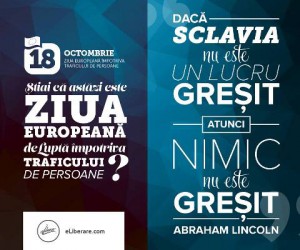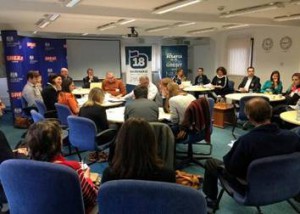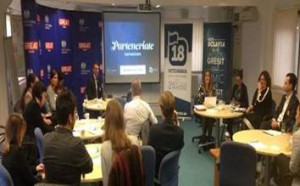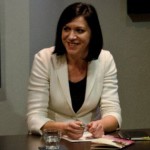18th November 2015 Bucharest, Romania
Reflections Post A Marathon of Debates
Forty pairs of eyes watched us curiously in the library of the Josika Miklos High School. The teachers of the “Hungarian School”, as the high-school is known in this Transylvanian town still suffering the effects of de-industrialization and subsequent migration, invited me to talk to the students about trafficking in persons. Much to their praise, they do so each year, unlike many others schools and high-schools in the area where the topic is still looked at with some sort of shame. Or, better said, overlooked. This year I’ve extended the invitation to Codruta, a volunteer working in prevention activities with the eLiberare NGO.
 It seemed like the natural thing to do, following The Forum Against Human Trafficking – a week-long marathon of debates and round table talks organized by eLiberare around October 18, in which the underlying principle was “working together”. The events were hosted by the three Embassies most involved in tackling the trafficking in persons: the Netherlands Embassy, the British Embassy and the US Embassy.
It seemed like the natural thing to do, following The Forum Against Human Trafficking – a week-long marathon of debates and round table talks organized by eLiberare around October 18, in which the underlying principle was “working together”. The events were hosted by the three Embassies most involved in tackling the trafficking in persons: the Netherlands Embassy, the British Embassy and the US Embassy.
They are 8th grade students and many giggle while we talk about recruitment via social media or about how patient a “loverboy” can be. They stop when we reach the issue of exploitation in agriculture and construction. They are at that age most quoted in statistics about trafficking and Romania as a country of origin: “minor, 12 to 14, coming from an unstable environment… “
Building Partnerships and Trust
 After many years working in the field, this time I can look back to the many pairs of eyes in a classroom with more hope and confidence that we have come to a moment of truth in which we can clearly say: this is what we are, this is what we can do and, most important, this is how and why we must work together. And this “we” generously includes “the various stakeholders”: not for profit organizations, public authorities at national and local level. Yes, there are still problems difficult to tackle, as pointed out during the debate on prosecution at the Dutch Embassy, such as alarmingly low sentences for traffickers or the flaws in guaranteeing confidentiality of the survivors. Or, most important, the frustrating procedure of confiscating assets resulted from what we know is “the second most profitable business in the world”.
After many years working in the field, this time I can look back to the many pairs of eyes in a classroom with more hope and confidence that we have come to a moment of truth in which we can clearly say: this is what we are, this is what we can do and, most important, this is how and why we must work together. And this “we” generously includes “the various stakeholders”: not for profit organizations, public authorities at national and local level. Yes, there are still problems difficult to tackle, as pointed out during the debate on prosecution at the Dutch Embassy, such as alarmingly low sentences for traffickers or the flaws in guaranteeing confidentiality of the survivors. Or, most important, the frustrating procedure of confiscating assets resulted from what we know is “the second most profitable business in the world”.
But then there are also proofs of how far we have come: the partnerships between not for profits and public institutions, be it local or national, focused on prevention or survivals’ assistance, shows time and again that informal, grassroots coalitions built in times of need, often work better than those resulted from dry, endless applications to donors or grant givers. The National Agency Against Trafficking in Persons’ representatives generously opened the debate at the British Embassy by talking about what went well and less so and the need to build trust among partners. Trust building, in a country where social trust is still at its lowest, in a field still marked by under financing, overwhelming personalities (as it takes one as such to resist in such an environment), suspicions of abuse and corruption, of “cynical play” and confusing legislation, is probably the biggest gain of the day.
I come back to the students and as I talk to them about what it means to be vulnerable, I see some of those eyes looking down. “Do you know what domestic violence means? Victims are often recruited from families suffering from physical and emotional abuse, as they are desperately trying to find a way out from sufferance. Often, the recruiter is someone from their network. Be careful who you trust and always try to find someone to talk to. Someone you can trust. You are at the age when you want to explore the world and you want to accumulate experiences. It is a wonderful time so make the most out of it also by being prudent as well as generous with your colleagues, with your friends, by looking after them”.
Civil Society’s Coming of Age
 It often occurred to me that the civil society organizations working in the field of combating trafficking have come of age. Many of them are now at a level in which they are able to provide expertise and work together with public authorities so as to rightfully “support and defence”, as emphasized in the recent Modern Slavery Act, the survivor. There is actually a WORKING Working Group led by the National Anti- Agency and joined by several NGOs, on reforming the standards for shelters. Usa Deschisa and People to People Foundation have described the anachronisms of the existing ones repeatedly and we are hoping to present the Ministry of Labour with a new set of standards and protocols that would actually make sense in this very complex field that is governed by principles such as “confidentiality and the regaining of autonomy”. We are also aware that organizations themselves, as mentioned during the third debate focused on protection and hosted by the US Embassy at the National Library, need to meet upgraded standards of accountability and transparency. “Who guards the guardians and who the guardians are?” should probably be the topic of our next meeting. In the meantime, I have to say “hats off” to eLiberare and their partners for generating such a substantial week of debates. Somewhere in a report it must show up as “network building activity”. It was a bit more than that and all those willing to show honesty and maturity while also being willing to listen to the others made it more than just another conference.
It often occurred to me that the civil society organizations working in the field of combating trafficking have come of age. Many of them are now at a level in which they are able to provide expertise and work together with public authorities so as to rightfully “support and defence”, as emphasized in the recent Modern Slavery Act, the survivor. There is actually a WORKING Working Group led by the National Anti- Agency and joined by several NGOs, on reforming the standards for shelters. Usa Deschisa and People to People Foundation have described the anachronisms of the existing ones repeatedly and we are hoping to present the Ministry of Labour with a new set of standards and protocols that would actually make sense in this very complex field that is governed by principles such as “confidentiality and the regaining of autonomy”. We are also aware that organizations themselves, as mentioned during the third debate focused on protection and hosted by the US Embassy at the National Library, need to meet upgraded standards of accountability and transparency. “Who guards the guardians and who the guardians are?” should probably be the topic of our next meeting. In the meantime, I have to say “hats off” to eLiberare and their partners for generating such a substantial week of debates. Somewhere in a report it must show up as “network building activity”. It was a bit more than that and all those willing to show honesty and maturity while also being willing to listen to the others made it more than just another conference.
Agreeing to Differ With Respect And Solidarity
There will always be issues, methods and even principles we will disagree on: amongst ourselves – the civil society organizations -, among us and the public authorities, among national and international stakeholders. But since I am still able to remember the times in which an entire country “agreed” on everything and dissent was punished, I can only be grateful for that. We will have different opinions, and not only opinions but well-researched arguments on how the institution of the National Rapporteur should function, ethical debates on whether prostitution should be legalized and so on. But we know that from great debates comes greater progress.
We ended our prevention activity by asking students to be generous and show support not only to their friends but also to those colleagues that might seem different: who are not well off, who are quieter or who might seem shy or withdrawn. It’s not very different from what my hopes are for what might be the motto of an extended and loose structure of actors working in combating trafficking: that whether we agree or disagree, we will do so with respect and solidarity.
